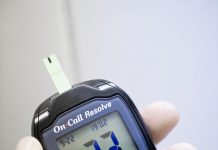The FDA is warning people about a new class of diabetes drugs that could result in ketoacidosis and may require hospitalization.

The U.S. Food and Drug Administration (FDA) is warning that the type 2 diabetes medicines canagliflozin, dapagliflozin, and empagliflozin may lead to ketoacidosis, a serious condition where the body produces high levels of blood acids called ketones that may require hospitalization.
We are continuing to investigate this safety issue and will determine whether changes are needed in the prescribing information for this class of drugs, called sodium-glucose cotransporter-2 (SGLT2) inhibitors.
Patients should pay close attention for any signs of ketoacidosis and seek medical attention immediately if they experience symptoms such as difficulty breathing, nausea, vomiting, abdominal pain, confusion, and unusual fatigue or sleepiness.
Do not stop or change your diabetes medicines without first talking to your prescriber. Health care professionals should evaluate for the presence of acidosis, including ketoacidosis, in patients experiencing these signs or symptoms; discontinue SGLT2 inhibitors if acidosis is confirmed; and take appropriate measures to correct the acidosis and monitor sugar levels.
SGLT2 inhibitors are a class of prescription medicines that are FDA-approved for use with diet and exercise to lower blood sugar in adults with type 2 diabetes. When untreated, type 2 diabetes can lead to serious problems, including blindness, nerve and kidney damage, and heart disease. SGLT2 inhibitors lower blood sugar by causing the kidneys to remove sugar from the body through the urine. These medicines are available as single-ingredient products and also in combination with other diabetes medicines such as metformin (see Table 1 below). The safety and efficacy of SGLT2 inhibitors have not been established in patients with type 1 diabetes, and FDA has not approved them for use in these patients.
A search of the FDA Adverse Event Reporting System (FAERS) database identified 20 cases of acidosis reported as diabetic ketoacidosis (DKA), ketoacidosis, or ketosis in patients treated with SGLT2 inhibitors from March 2013 to June 6, 2014 (see Data Summary). All patients required emergency room visits or hospitalization to treat the ketoacidosis. Since June 2014, we have continued to receive additional FAERS reports for DKA and ketoacidosis in patients treated with SGLT2 inhibitors.
Continue Reading Below ↓↓↓
DKA, a subset of ketoacidosis or ketosis in diabetic patients, is a type of acidosis that usually develops when insulin levels are too low or during prolonged fasting. DKA most commonly occurs in patients with type 1 diabetes and is usually accompanied by high blood sugar levels. The FAERS cases were not typical for DKA because most of the patients had type 2 diabetes and their blood sugar levels, when reported, were only slightly increased compared to typical cases of DKA. Factors identified in some reports as having potentially triggered the ketoacidosis included major illness, reduced food and fluid intake, and reduced insulin dose.
We urge health care professionals and patients to report side effects involving SGLT2 inhibitors to the FDA MedWatch program, using the information in the “Contact FDA” box at the bottom of the page.
Table 1. List of SGLT2 inhibitors
| Brand name | Active ingredient(s) |
|---|---|
| Invokana | canagliflozin |
| Invokamet | canagliflozin and metformin |
| Farxiga | dapagliflozin |
| Xigduo XR | dapagliflozin and metformin extended-release |
| Jardiance | empagliflozin |
| Glyxambi | empagliflozin and linagliptin |
Facts about Sodium-glucose Cotransporter-2 (SGLT2) Inhibitors
- SGLT2 inhibitors are a class of prescription medicines that are FDA-approved for use with diet and exercise to lower blood sugar in adults with type 2 diabetes.
- The safety and efficacy of SGLT2 inhibitors have not been established in patients with type 1 diabetes, and FDA has not approved them for use in these patients.
- Medicines in the SGLT2 inhibitor class include canagliflozin, dapagliflozin, and empagliflozin. They are available as single-ingredient products and also in combination with other diabetes medicines such as metformin (see Table 1 in the Safety Announcement section for a complete list).
- SGLT2 inhibitors lower blood sugar by causing the kidneys to remove sugar from the body through the urine.
- In addition to acidosis, other possible side effects of SGLT2 inhibitors include dehydration, kidney problems, low blood sugar when this class of medicines is combined with other prescription medicines used to treat diabetes, increased cholesterol in the blood, and yeast infections.
More Info for Patients
- Acidosis is when there is too much acid in the body. Diabetic ketoacidosis and ketoacidosis, serious conditions in which the body produces high levels of blood acids called ketones, have been reported in patients using the diabetes medicines known as sodium-glucose cotransporter-2 (SGLT2) inhibitors (see Table 1 in the Safety Announcement section for a complete list). Ketones can build up in the body if insulin levels are too low or during prolonged fasting.
- Pay close attention for any signs or symptoms of acidosis such as difficulty breathing, nausea, vomiting, abdominal pain, confusion, and unusual fatigue or sleepiness. Seek medical attention immediately if you experience any of these symptoms.
- Ketoacidosis associated with SGLT2 inhibitors may be present even if the blood sugar is not very high.
- The safety and efficacy of SGLT2 inhibitors have not been established in patients with type 1 diabetes, and FDA has not approved them for use in these patients.
- Do not stop or change your diabetes medicines without first talking to your health care professional. When untreated, diabetes can lead to serious problems, including blindness, nerve and kidney damage, and heart disease.
- Read the patient Medication Guide or Patient Package Insert you receive with your SGLT2 inhibitor prescription. They explain the benefits and risks associated with the use of the medicine. You may access FDA Medication Guides.
- Talk to your health care professional if you have questions or concerns about SGLT2 inhibitors or any of your other diabetes medicines.
- Report side effects from SGLT2 inhibitors to the FDA MedWatch program, using the information in the “Contact FDA” box at the bottom of this page.
Source: FDA










